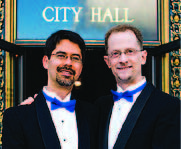 During LGBTQ Pride Month this year, we find ourselves thinking about a book I studied years ago in college: 20th century political philosopher John Rawls’ A Theory of Justice. In that text, Rawls invites readers to consider how they would structure society’s institutions and laws if they did so behind a “veil of ignorance” in which they did not know what place they themselves would occupy in society. For instance, if you didn’t know what natural abilities, skills, or family background you would have, how would you structure an economic system? If you didn’t know what race you would be, what policies would you put in place regarding social, legal and economic justice? Or if you didn’t know whether or not you would be LGBTQ, what laws would you draft pertaining to liberty and equality, and how would LGBTQ people be treated in such a society?
During LGBTQ Pride Month this year, we find ourselves thinking about a book I studied years ago in college: 20th century political philosopher John Rawls’ A Theory of Justice. In that text, Rawls invites readers to consider how they would structure society’s institutions and laws if they did so behind a “veil of ignorance” in which they did not know what place they themselves would occupy in society. For instance, if you didn’t know what natural abilities, skills, or family background you would have, how would you structure an economic system? If you didn’t know what race you would be, what policies would you put in place regarding social, legal and economic justice? Or if you didn’t know whether or not you would be LGBTQ, what laws would you draft pertaining to liberty and equality, and how would LGBTQ people be treated in such a society?
I believe the framework Rawls constructs calls powerfully for laws and institutions that ensure full liberty and equality for LGBTQ people. Under Rawls’ framework, rational people would not design a system where some people face scorn and ridicule and lack emotional and physical safety because of who they are or whom they love. Rational people would create legal protections and opportunities for all citizens. They would not create a system where some people would be forbidden to marry if they thought they might want to marry someday, but didn’t know whether they would be one of the lucky ones who could. They would not create a system that left people vulnerable to job discrimination if they wanted job security themselves. And they would not create a society with constricted gender norms and laws if they did not know what their own gender identities would be.
Perhaps Rawls’ scholarly political philosophy boils down to the Golden Rule—do unto others as you would have them do unto you—referenced by President Obama when he announced his support for marriage equality in 2012, or to the adage “put yourself in the other person’s shoes.” Although some might dismiss these age-old directives as cliché, we as individuals and our society collectively still struggle to implement them. Rawls’ framework also points to looking beyond oneself and to recognizing the value of helping others, even when it does not directly benefit oneself. The LGBTQ movement uniquely integrates these arguably distinct notions. As LGBTQ people have come out individually over the decades to live their lives in personally fulfilling ways, millions of people have benefitted by the resulting increase in understanding that forms the basis for recently attained political and legal advances, which have long been aims of the movement.
Finally, this Pride season, we find ourselves asking a question that Rawls’ didn’t quite envision people asking behind the so-called “veil of ignorance.” If we could choose whether to be LGBTQ in this society just as it is now—for better and for worse—would we do so? Our answer is a resounding yes! As Rawls’ framework invites imagination about our lives, we cannot imagine our lives without the blessings that being LGBTQ has brought us: the experiences, the friendships, the joy, the wisdom and empathy born of struggle, the breadth of understanding of human experience, the freedom from constraints of gender conformity, and the pride. As the Oxford Dictionary defines pride: “the consciousness of one’s own dignity,” “self-esteem,” “self-respect,” and “deep…satisfaction derived from…the achievements of those with whom one is closely associated…” Happy Pride 2015, everyone!
John Lewis and Stuart Gaffney, together for three decades, were plaintiffs in the California case for equal marriage rights decided by the California Supreme Court in 2008. They are leaders in the nationwide grassroots organization Marriage Equality USA.
Recent Comments